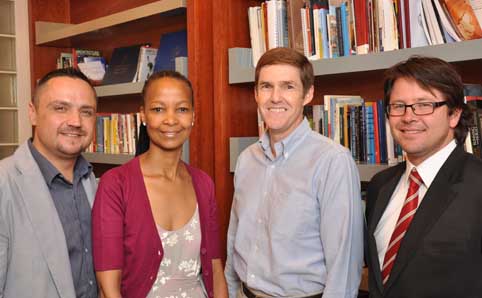Latest News Archive
Please select Category, Year, and then Month to display items
12 January 2024
|
Story Nonsindiswe Qwabe
|
Photo Sonia Small
 Since joining the UFS in 2008, Dr Grey Magaiza has worked extensively on approaches that can foster the socio-economic transformation of societies.
Since joining the UFS in 2008, Dr Grey Magaiza has worked extensively on approaches that can foster the socio-economic transformation of societies.
“The future should be one where communities can decide on their development agenda and futures. That’s the most important for me.” Dr Grey Magaiza, Deputy Director of the Centre for Gender and Africa Studies (CGAS) and Head of the Community Development programme on the Qwaqwa Campus, is passionate about capacitating communities to be agents of change and advancement. His vision for the future emphasises the empowerment of communities to take charge of their development by actively participating in decision making and the implementation of development projects that can improve their lives.
Since joining the UFS in 2008, Dr Magaiza has worked extensively on approaches that can foster the socio-economic transformation of societies. Over the years, he has crafted his research speciality into one that he is most proud of – being an interdisciplinary scientist immersed in the development of communities.
“I’m in a fortunate position of researching what I like. I say ‘fortunate’, because I’ve taken the time to understand what I’m passionate about, which is the overall field of rural livelihoods and livelihood futures – in short, community development. My research starts from an engaged university, understanding the elements that a university must use to enhance transformation and relevance to its immediate community in terms of development.”
One of the ways he has done this is by looking at social entrepreneurship as a development approach for young people in a rural setting. Through workshops with non-profit and civic organisations in Qwaqwa, Dr Magaiza has been helping these organisations to map out their needs and actively meet them through the involvement and support of external role players.
“We understand that communities are part of the national development agenda, but even that national agenda respects community knowledge and intentions and allows communities to shape their identity. A critical enabler of this is community organising. You bring back the capacity in communities to have dialogues on issues affecting them as spaces for engagement, knowledge exchange, and for people to just talk about their way forward.”
By enabling communities to define their development agenda, they can address their specific needs, challenges, and aspirations, he said. “When I look at livelihood futures, it’s quite an exciting aspect of my work – it’s like looking into a fortune tellers’ globe, because you’re not deciding for communities what they should do, but the communities themselves take those decisions.”
US Consul-General learns about transformation at the UFS
2011-11-11
 |
|
A delegation from the US consulate came to learn more about our transformation initiatives and the Leadership for Change programme. From the left are: Prof. Aldo Stroebel, Director of International Academic Projects in the Office of the Vice-Chancellor; Mrs Dineo Gaofhiwe-Ingram, Assistant-Director: International Affairs; Mr Earl Miller, US Consul-General; and Mr Rudi Buys, Dean of Student Affairs.
|
When others visit our university to learn more about our transformation initiatives, we certainly are on the right track.
Mr Earl Miller, Consul-General at the United States Consulate in Johannesburg, paid our university a visit as part of his orientation trip to the Free State.
Mr Miller, who was accompanied by two senior colleagues from his office, was interested to learn more about our university’s initiatives relating to transformation, the Leadership for Change programme and the work done at the International Institute for Studies in Race, Reconciliation and Social Justice.
He met with some of the students who had recently returned from the USA and Europe to reflect on their experiences on the programme and expressed his appreciation for the initiative, since it also afforded American students an opportunity to learn from their South African peers.